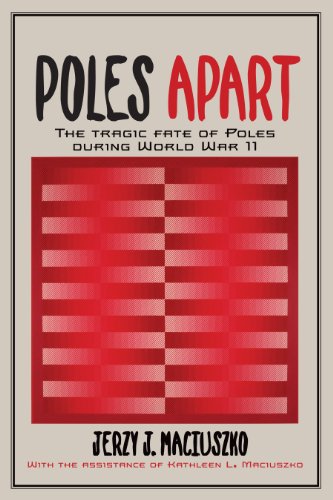Nazi Concentration Camps Low Survivorship Maciuszko

Poles Apart, by Jerzy Janusz Maciuszko. 2013
Nazi Death Camps Were Not Much Deadlier Than “Ordinary” Concentration Camps. Warsaw Uprising Daring Raid
This book is an anthology of Poles and their experiences during WWII. They are mainly those who are relatives of the author, and mainly are Poles from the Cleveland, Ohio area. The experiences include those of Poles fighting against the Germans in the 1939 war, captivity in Nazi German and Soviet camps, surviving the occupying powers during and after the war, and in rebuilding life in the west after WWII. A number of the postwar works of author Jerzy J. Maciuszko are included, as are some of his awards and memorabilia.
THE GERMAN AND SOVIET VICTORS MISTREAT THEIR POLISH POWS
The invading Germans took the author, an officer cadet, prisoner near Pomorze during the 1939 war. The POWs were poorly fed. The German authorities, in open defiance of the Geneva Convention, forced these officer POWs to perform forced labor. (p. 23).
Both the German and Soviet nations episodically forced their Polish captives to work all seven days a week. (pp. 49-50, p. 200). This not only deprived the captives of much-needed rest, but also deprived them of being able to look forward to a day off.
Jerzy J. Maciuszko describes the experiences of Anthony (Antoni) Palmowski. He rejects the commonly seen de-Germanization of the Nazis, and points out that every single Nazi he met was a German. (p. 216).
PACKED SOVIET DEPORTATION TRAINS UNDERMINE OFFICIAL SOVIET STATISTICS ON DEPORTEES
Eugene Bak and his family was deported by the Soviets to the interior of the USSR, as described by Jerzy J. Maciuszko. Each of the train cars were overcrowded with 35-40 passengers. (p. 176). This adds to numerous other testimonies that refute the ridiculously low 25-per-car official Soviet figures, on which their undercounted Polish-deportee figure (of only 400,000 or less) is based. For more on this, please click on Polish Poetry from the Soviet Gulags: Recovering a Lost Literature, and read the detailed Peczkis review.
LOW SURVIVORSHIP IN “ORDINARY” NAZI GERMAN CONCENTRATION CAMPS
Author Jerzy J. Maciuszko describes some Poles he knew who were incarcerated by the Germans at Mauthausen–near Linz, Austria. Out of a group of 200 Poles, only 8 survived the five-year captivity (May 1940–May 1945). (p. 218). Now consider the fact that it has been argued that extermination camps, in which Jews died, should not be conflated with “ordinary” concentration camps, in which Poles were housed, because Poles had some chance of survival. While this is technically true, the differences were small (zero percent for death camps versus four percent for concentration camps).
The Polish inmates reported that, starting in 1945, the Jewish inmates of Mauthausen were treated noticeable better, and were now given better clothes. (pp. 226-227). This corroborates similar testimonies elsewhere.
THE SOVIET-BETRAYED WARSAW UPRISING (1944)
Author Jerzy J. Maciuszko reproduces several written testimonies of Cleveland-area Polish veterans of the Warsaw Uprising. I elaborate on two of them.
Dr. Wojciech Rostafinski was an eyewitness to the A. K. (ARMIA KRAJOWA)’s liberation of Jews imprisoned in the Gesiowka concentration camp. The Polish insurgents had captured a German Panther tank, and then used it to break through the barricades protecting the camp. They also used the shells of the tank to put all eight brick gun towers out of action around the camp. (pp. 270-273).
Jerzy Grabowski recounts a daring A. K. operation behind German lines. The Poles’ assignment was to sever German phone wires. German sentries spotted the Poles. With nerves of steel, the insurgents removed their red- and white-band insignia, and acted as if they were workers. The ruse worked! The intrepid Poles completed their mission and returned to Polish lines without suffering any losses. (pp. 283-285).
To see a series of truncated reviews in a Category click on that Category:
- All reviews
- Anti-Christian Tendencies
- Anti-Polish Trends
- Censorship on Poles and Jews
- Communization of Poland
- Cultural Marxism
- German Guilt Dilution
- Holocaust Industry
- Interwar Polish-Jewish Relations
- Jewish Collaboration
- Jewish Economic Dominance
- Jews Antagonize Poland
- Jews Not Faultless
- Jews' Holocaust Dominates
- Jews' Holocaust Non-Special
- Nazi Crimes and Communist Crimes Were Equal
- Opinion-Forming Anti-Polonism
- Pogrom Mongering
- Poland in World War II
- Polish Jew-Rescue Ingratitude
- Polish Nationalism
- Polish Non-Complicity
- Polish-Ukrainian Relations
- Polokaust
- Premodern Poland
- Recent Polish-Jewish Relations
- The Decadent West
- The Jew as Other
- Understanding Nazi Germany
- Why Jews a "Problem"
- Zydokomuna